Welcome to the real estate grind, where your passion for property smacks head-on into the soul-crushing reality of bookkeeping. Whether you’re a solo agent juggling commissions, a landlord tracking rental income across Los Angeles, or a flipper drowning in project budgets, one truth is universal: messy finances murder your profits and your sanity. Spreadsheets and shoeboxes of receipts aren’t just old-school; they’re a one-way ticket to missed deductions, compliance nightmares, and boneheaded business decisions. What if you could put the number-crunching on autopilot, get crystal-clear financial reports, and spend more time actually closing deals?
That’s precisely where the right tech flips the script. Beyond just saving time, the best real estate accounting software arms you with the insights to strategically increase profit margins. This guide cuts through the marketing BS to give you the real scoop on the best real estate accounting software platforms kicking butt today. We’re diving into the nitty-gritty of each tool, complete with screenshots and direct links.
We’ll break down who each platform is really for, its potential hidden costs, and the make-or-break features you need to know about. Let’s find the perfect tool to get your books in order and your business booming.
1. AppFolio Property Manager
AppFolio Property Manager isn’t just an accounting tool; it’s a full-blown ecosystem for conquering your real estate portfolio. Its magic lies in a deeply integrated approach where powerhouse, property-level accounting serves as the financial backbone for a whole suite of management tools. This makes it a beast and one of the best real estate accounting software options for managers who want to vaporize the data silos between their financial, operational, and leasing activities. For property pros managing residential, commercial, or even student housing, AppFolio delivers a single source of truth, from tracking tenant payments and crushing CAM reconciliations to processing vendor invoices and generating slick owner statements.
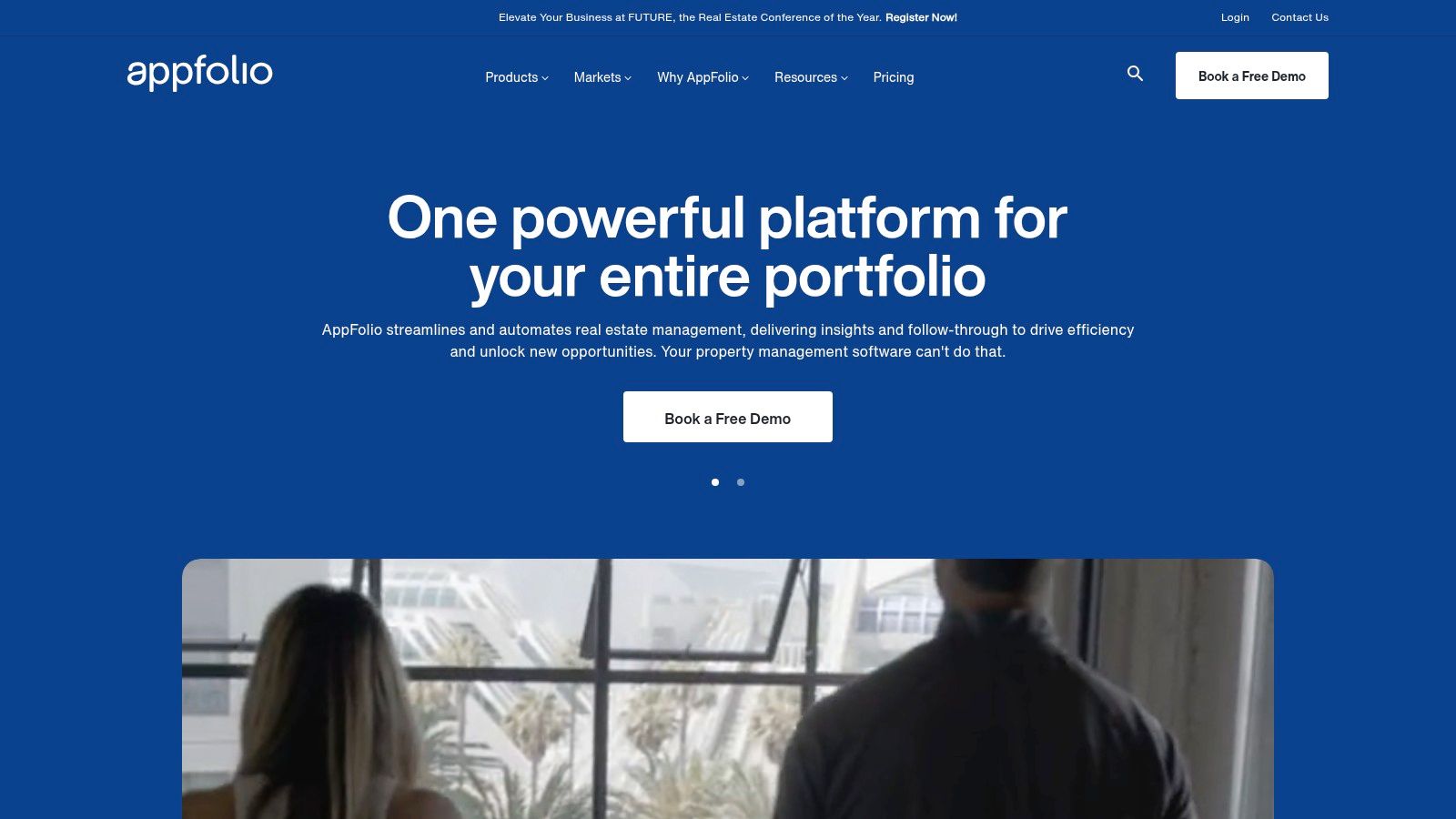
The platform’s end-to-end design is its main flex. Forget duct-taping accounting software to separate leasing and maintenance platforms; here, you get everything under one roof. But this all-in-one power comes with an enterprise-level price tag. Pricing is a mystery box requiring a custom quote, often loaded with minimum unit counts and hefty onboarding fees. This setup makes it a dream for established mid-to-large-scale operators but might be total overkill for smaller investors just getting their feet wet. For a detailed breakdown of its features against other top platforms, you can see our full property management software comparison.
Website: https://www.appfolio.com
Best For: Mid-to-large portfolio managers seeking an all-in-one system.
| Pros | Cons |
|---|---|
| Fully integrated accounting & property management | Hidden pricing and onboarding fees |
| Robust workflows for various portfolio types | Minimum unit requirements can be a barrier |
| Powerful owner and tenant portals | May be too complex for small landlords |
2. Buildium
Buildium hits that sweet spot between beast-mode functionality and user-friendly design, making it a go-to for small to mid-sized property managers. Instead of an intimidating enterprise-first vibe, Buildium offers a clear, scalable path for growing portfolios with transparent pricing tiers. Its platform delivers a full suite of property management tools built around a rock-solid accounting core that handles general ledger, automated fee collection, and trust accounting like a champ. This makes it one of the best real estate accounting software choices for managers who need serious financial tracking without the headache or cost of a massive, all-in-one system. From handling tenant rent payments to managing vendor bills and generating owner statements, Buildium streamlines the entire financial lifecycle of a property.
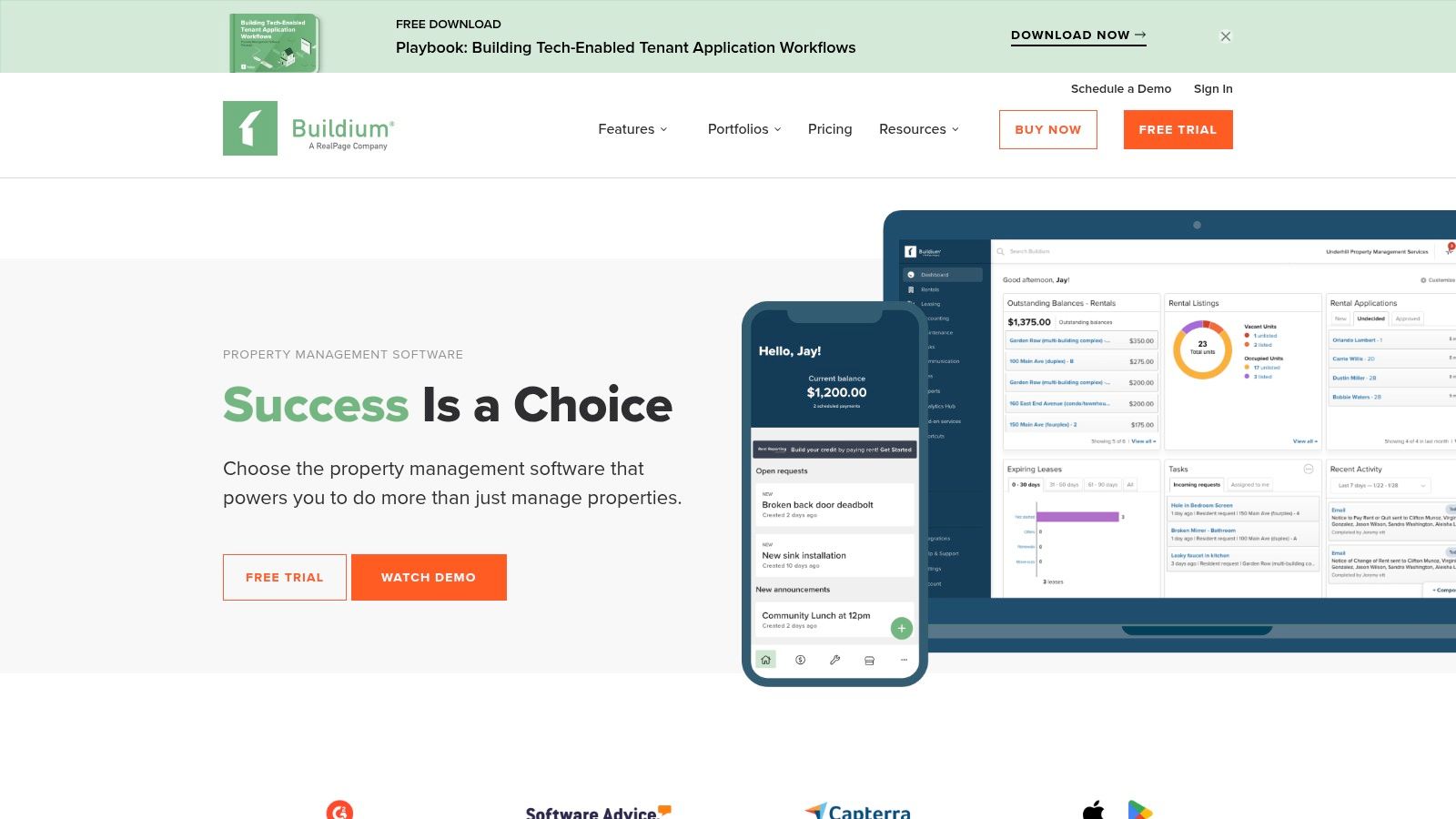
What makes Buildium pop is its accessibility, offering a 14-day free trial and public pricing that scales right alongside your unit count. This transparency is a godsend, helping managers forecast costs as they expand. The platform is a workhorse, covering core accounting, maintenance tracking, and resident/owner portals in its base packages. However, keep an eye out for add-on fees for premium features like property inspections or e-signing, which can inflate the total cost. While it may not have the deep customizability of larger enterprise solutions, its clean interface and stellar reputation for customer support make it an awesome launchpad for pros looking to graduate from spreadsheets.
Website: https://www.buildium.com
Best For: Small to mid-sized portfolio managers looking for a scalable, user-friendly platform.
| Pros | Cons |
|---|---|
| Transparent plan tiers | Add-on fees for some premium features |
| 14-day free trial available | Costs increase directly with the number of units |
| Strong reputation among SMB managers | Top-tier features like Open API are costly |
3. Yardi Breeze
Yardi Breeze channels the raw power of its enterprise-level big brother, Yardi Systems, into an accessible, cloud-based platform built for small to mid-size portfolios. It offers a refreshingly simple take on property management and accounting, making it one of the best real estate accounting software choices for independent owners and growing managers who need robust tools without an overwhelming interface. The platform crushes core accounting functions like accounts payable, receivables, and bank reconciliations while weaving them directly into essential management tasks, such as online leasing, tenant screening, and maintenance tracking for both residential and commercial properties.
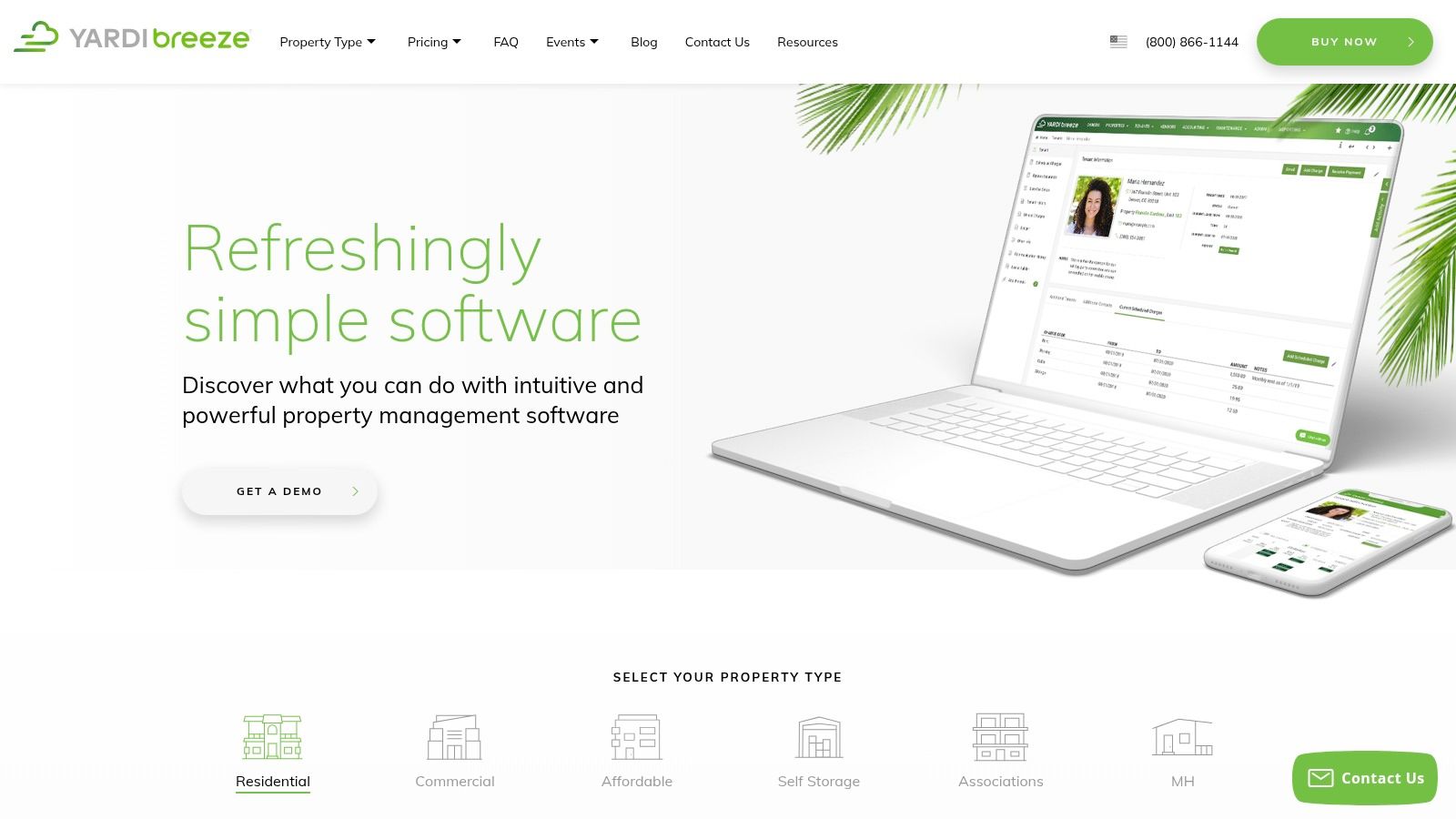
What makes Yardi Breeze stand out is its transparent, per-unit pricing and a lower barrier to entry compared to its more complex sibling, Yardi Voyager. While there are monthly minimum fees, the published pricing structure is a breath of fresh air in an industry famous for hidden costs. The platform comes in two flavors: Breeze and Breeze Premier. The standard Breeze plan has all the essentials covered, while Premier throws in advanced features like job cost tracking and corporate accounting. This scalability lets your software grow with your portfolio, offering a clear upgrade path backed by one of the biggest names in real estate tech.
Website: https://www.yardibreeze.com
Best For: Small to mid-size portfolio owners needing a scalable, user-friendly solution.
| Pros | Cons |
|---|---|
| Low entry per-unit pricing | Monthly minimum fees apply |
| Supports both residential and commercial properties | Premier pricing varies and may require bundling |
| Reputable backing by Yardi | Less customizable than enterprise-level systems |
4. DoorLoop
DoorLoop storms onto the scene as an all-in-one property management platform that isn’t shy about its pricing, making it a refreshingly transparent choice for landlords and growing property management firms. It fuses robust accounting functionalities with must-have leasing and maintenance tools, all designed to streamline operations without the enterprise-level price tag. This integrated approach ensures your financial data—from rent collection to vendor payments—is always wired to tenant and property records, cementing its spot as one of the best real estate accounting software options for those who want a comprehensive yet accessible system. DoorLoop is built for hustlers who want to manage their entire portfolio, from listing a vacant unit to reconciling bank accounts, all from a single dashboard.
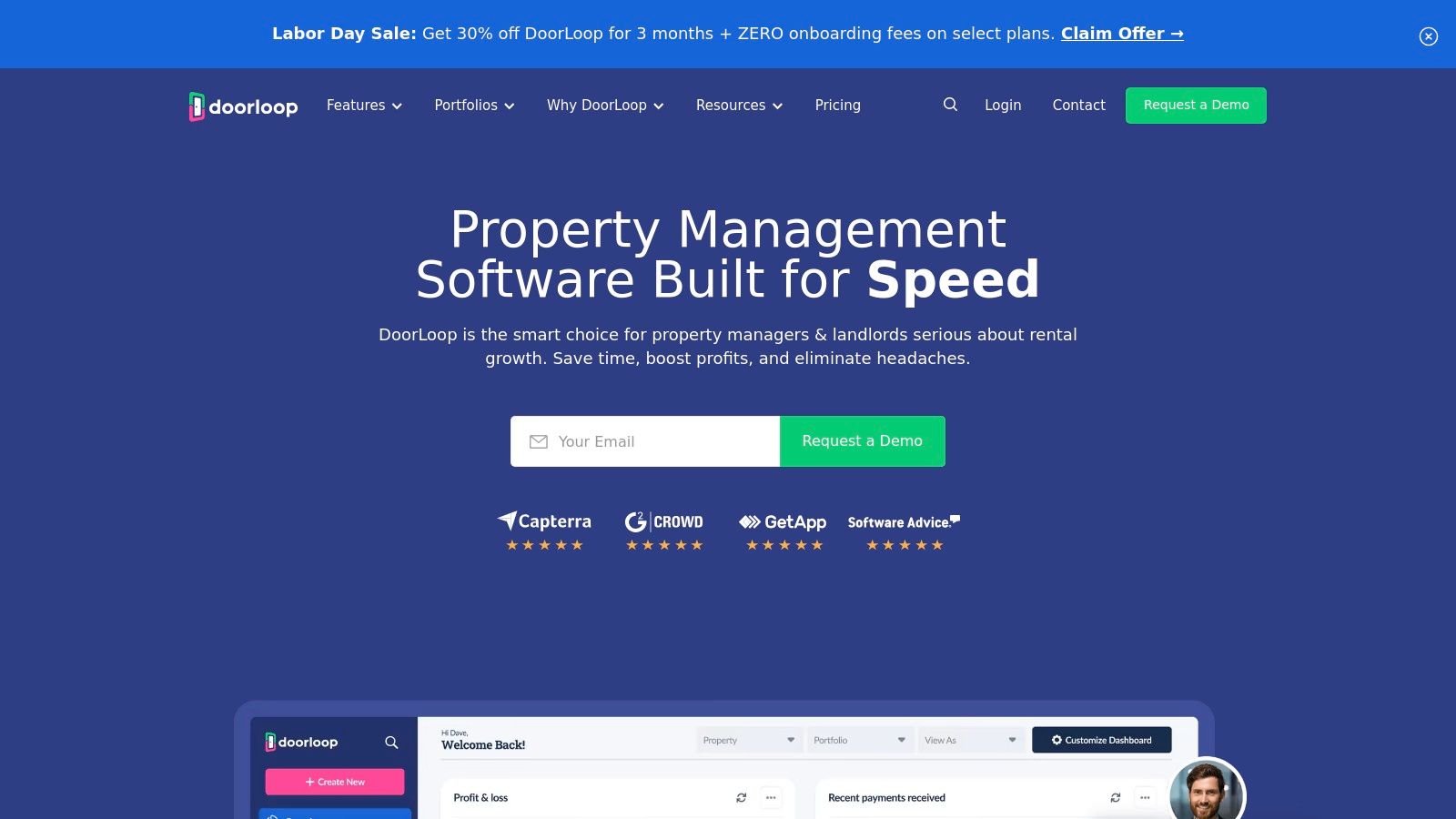
The platform’s killer feature is its straightforward, self-serve pricing model, which is a total mic drop compared to the custom-quote standard set by many competitors. Plans are laid out plain and simple online, letting smaller operators budget like a boss without surprise fees. While it offers a powerful suite of tools, including a full chart of accounts, bank reconciliations, and owner statements, heads up: onboarding fees are still a thing and scale with your portfolio size. Plus, some value-added services on lower-tier plans might come with extra transaction fees. This makes DoorLoop a fantastic fit for users who prioritize transparent costs and a slick, modern interface.
Website: https://www.doorloop.com
Best For: Small to mid-sized landlords and property managers who value transparent pricing.
| Pros | Cons |
|---|---|
| Clear and transparent pricing plans | Onboarding fees scale with portfolio size |
| Discounts available for annual billing | Transaction fees on some services at lower tiers |
| Robust customer support tiers | Newer platform still building out enterprise features |
5. Rentec Direct
Rentec Direct carves out its turf by offering powerful, accessible tools that speak directly to DIY landlords and smaller property management firms. While it provides a full suite of management features, its accounting module is a real beast, handling everything from property and tenant ledgers to trust accounting compliance with zero sweat. This makes it one of the best real estate accounting software choices for pros who need professional-grade financial tools without the enterprise-level price tag or complexity. The platform excels at putting core tasks like ACH rent collection and detailed financial reporting (including Schedule E helpers for tax time) on autopilot.
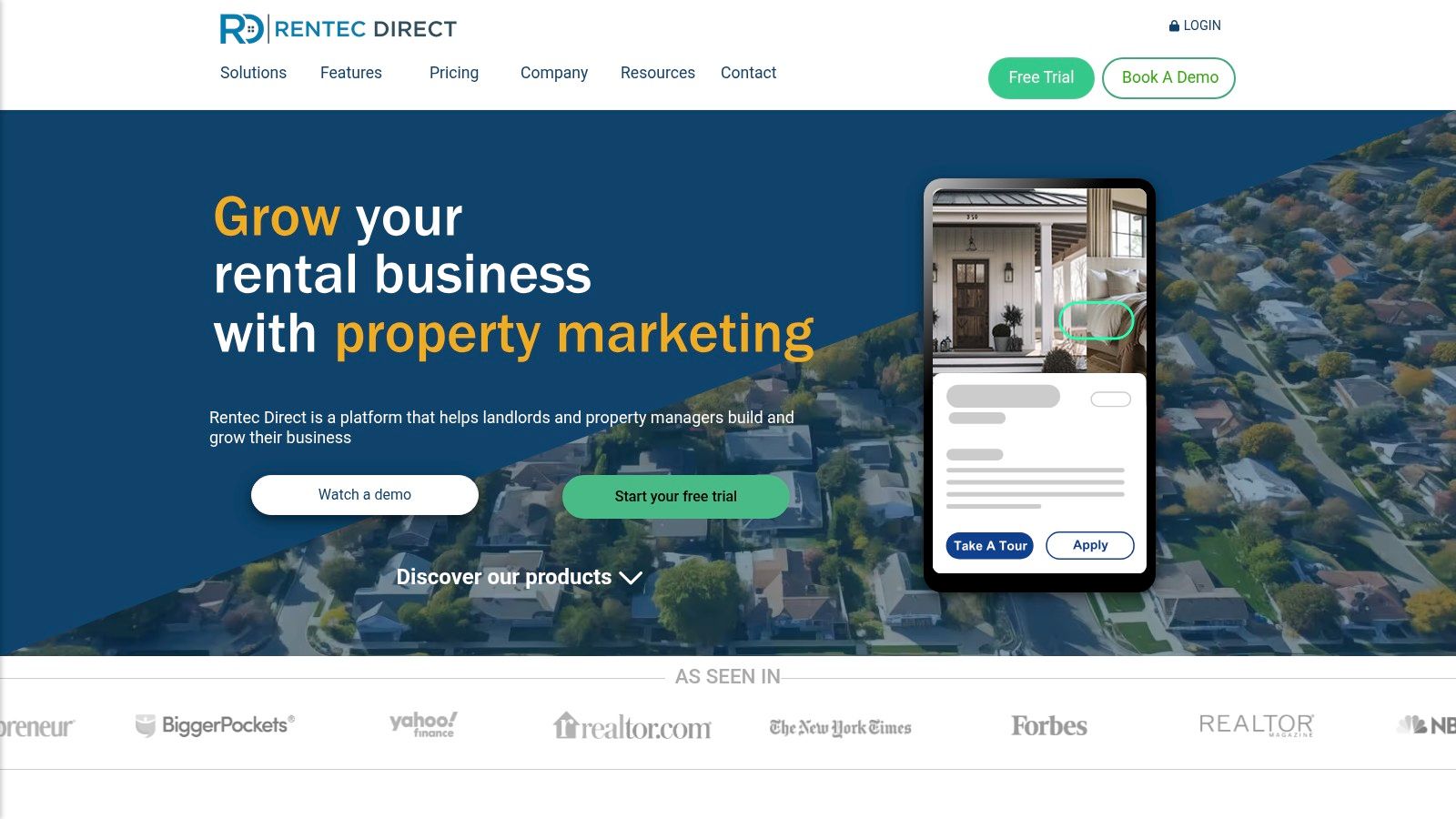
What makes Rentec Direct a standout is its no-nonsense pricing and accessibility. Unlike platforms that hide costs behind demos and sales calls, Rentec Direct offers clear, low per-unit pricing and a free trial, letting you test-drive the system without dropping a dime. It even offers QuickBooks synchronization for those who want to keep their existing chart of accounts. While there’s no forever-free plan and some advanced features come with extra fees, the core package delivers insane value for independent operators managing up to a few hundred units.
Website: https://www.rentecdirect.com
Best For: Small to mid-sized landlords and property managers needing affordable, professional-grade accounting.
| Pros | Cons |
|---|---|
| Low per-unit cost and transparent pricing | Extra fees for some features and add-ons |
| Free trial available to test the platform | No perpetual free tier for very small portfolios |
| Unlimited storage and user seats | Interface feels less modern than some competitors |
6. Stessa
Stessa was built from the ground up for one crowd: DIY landlords and investors rocking smaller portfolios. Instead of trying to be a bloated, all-in-one property management ecosystem, it goes all-in on simplifying the financial tracking and reporting side of rental ownership. This laser focus makes it one of the best real estate accounting software options for those who want clear, automated financial insights without the cost or complexity of enterprise systems. Its core mission is to slurp up income and expense data for each property, automate categorization, and spit out the reports you need for tax time, like the dreaded Schedule E.
The platform’s knockout punch is its seriously powerful free “Essentials” plan, which delivers huge value with features like automatic bank feeds, receipt scanning, and performance dashboards. Unlike many competitors that lock up core functionality behind a paywall, Stessa gives you the goods for free, making it incredibly accessible for investors just starting to build their empire. While the free tier is legit, features like advanced reporting, e-signatures, and accelerated rent payments are reserved for its affordable paid plans. The intuitive interface and dead-simple setup process lower the barrier to entry, letting landlords get organized fast.
Website: https://www.stessa.com
Best For: DIY landlords and investors with small-to-midsize portfolios.
| Pros | Cons |
|---|---|
| Generous free “Essentials” plan | Advanced accounting is on the paid Pro plan |
| Excellent rental-focused tax reporting | E-signature capabilities are limited on lower tiers |
| Simple, intuitive user interface for beginners | Not built for complex commercial or mixed-use portfolios |
7. Propertyware (RealPage)
Propertyware, a RealPage company, dominates a specific niche by focusing almost exclusively on single-family rental management. This specialization allows its accounting features to be precision-tuned for the unique financial workflows of this asset class, like trust accounting and individual owner reporting. Unlike broader platforms, Propertyware offers a focused toolset that crushes it when managing scattered-site properties, making it one of the best real estate accounting software choices for managers who need surgical precision without the complexity of commercial or multi-family systems. The platform integrates accounting with tenant portals, maintenance coordination, and even text messaging, creating a streamlined command center for your operations.
The platform’s upfront pricing is a major win. With clear per-unit costs and published monthly minimums, it’s way easier for managers to forecast expenses compared to platforms with murky, quote-based pricing. But be ready for an implementation fee equal to two months of your subscription cost, plus various transaction fees for services like tenant screening and online payments. These side costs can add up, so it’s critical to factor them into your budget. Propertyware’s unlimited support and data storage are strong value props, especially for growing portfolios that need scalable back-office muscle without surprise fees.
Website: https://www.propertyware.com
Best For: Property managers specializing in single-family rental portfolios.
| Pros | Cons |
|---|---|
| Clear per-unit pricing with published minimums | Implementation fee equal to two months’ subscription |
| Focused feature set for single-family rentals | Monthly minimums may be a hurdle for small portfolios |
| Unlimited support, training, and storage | Transaction fees on screening and payments |
8. Rent Manager (LCS)
Rent Manager by London Computer Systems (LCS) is a true chameleon, offering a highly configurable property management and accounting system that can be bent and shaped to fit virtually any portfolio size or type. Its accounting core is an absolute juggernaut, featuring a complete general ledger, accounts payable and receivable automation, and powerful financial reporting with over 450 built-in reports. This makes it a top contender for the best real estate accounting software for operators who demand precise control and deep visibility into their financial data without being boxed into a rigid, one-size-fits-all platform. From multifamily to commercial and everything in between, its insane flexibility is its signature move.
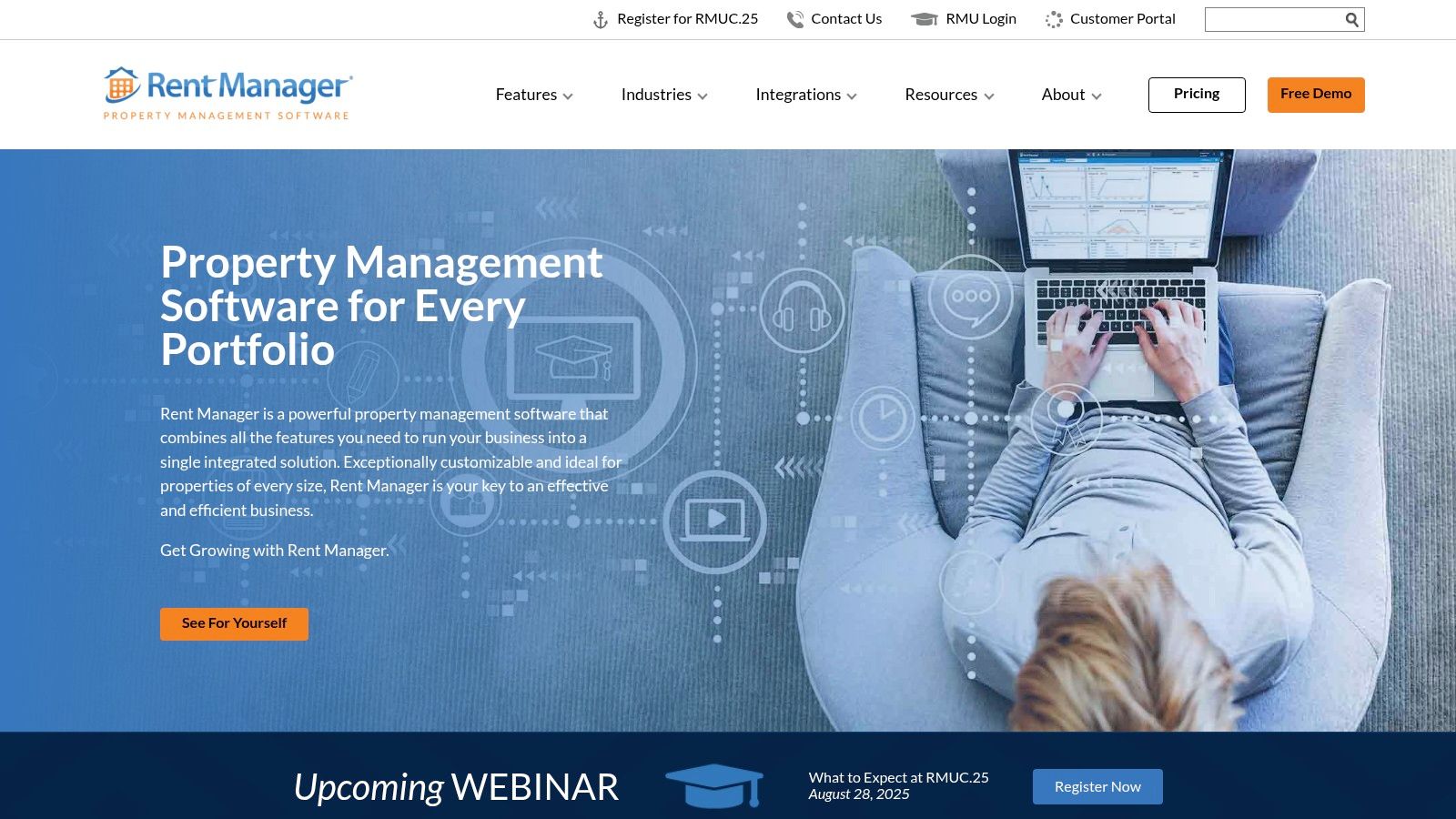
This level of customization means the setup is more of a project than a plug-and-play affair. Rent Manager’s pricing is kept under wraps, and new users should budget for a significant implementation fee, often costing twice the monthly subscription. While the platform offers comprehensive training and support to get you up and running, the initial investment in time and money is considerable. The open API, which unlocks powerful third-party integrations, is also reserved for higher-tier plans. This structure positions Rent Manager as the perfect weapon for established businesses that require a scalable, feature-rich system and are ready for a more hands-on implementation.
Website: https://www.rentmanager.com
Best For: Operators of any size needing deep customization and reporting.
| Pros | Cons |
|---|---|
| Deep system customization | Pricing not publicly disclosed |
| Broad feature set with 450+ reports | Implementation fee typically twice the monthly subscription |
| Comprehensive implementation and training options | API available only on higher-tier bundles |
9. QuickBooks Online (Intuit)
QuickBooks Online is the Swiss Army knife of small business accounting. While not purpose-built for real estate, its universal familiarity and massive integration ecosystem make it impossible to ignore. For new investors, flippers, or small-scale landlords, it provides a solid, understandable foundation for tracking income, auto-categorizing expenses via bank feeds, and managing invoices. The platform’s real superpower for property pros is unlocked through its extensive app marketplace, which lets you bolt on property-specific features like rent collection and tenant management without ditching the accounting system your bookkeeper already knows and loves. This makes it one of the best real estate accounting software choices for those who prefer a customizable, build-your-own-adventure approach.
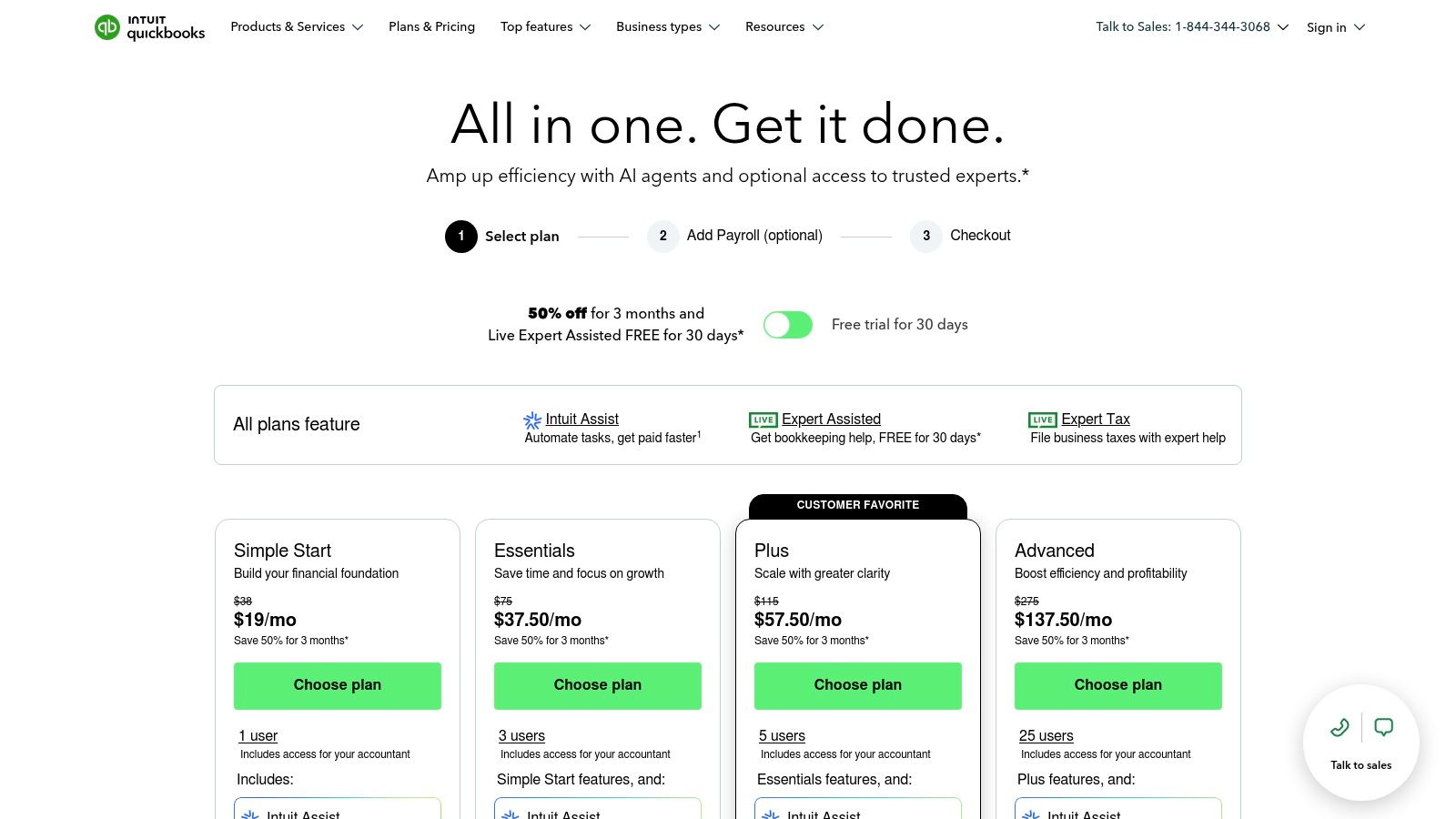
The primary trade-off is that QuickBooks demands customization to truly shine for real estate. Out of the box, it lacks property-level reporting and tenant ledgers, forcing users to rely on clever workarounds or add-on subscriptions. Pricing is transparent with multiple tiers available, but heads up—subscription costs got a bump in 2025. It’s a pragmatic choice for those who want a robust general ledger that can grow with their business, as many top brokers will attest, but be ready to invest time or money into tailoring it to your specific real estate needs.
Website: https://quickbooks.intuit.com/pricing/
Best For: Small investors, flippers, and landlords who want a familiar accounting base to customize with add-ons.
| Pros | Cons |
|---|---|
| Ubiquitous tool familiar to bookkeepers | Not specifically tailored for real estate out of the box |
| Easy to extend with real estate specific add-ons | Subscription prices increased in 2025 |
| Frequent promotions available | Core real estate features require extra cost/effort |
10. Realtyzam
Realtyzam is a lean, mean, bookkeeping machine designed with one user in mind: the real estate agent. Instead of bogging you down with a complex suite of property management tools, it hones in on the core financial tasks agents battle daily, like tracking commission income, wrangling expenses for tax time, and logging mileage. This laser focus makes it one of the best real estate accounting software choices for individual agents and small teams who find platforms like QuickBooks to be total overkill for their needs. It translates accounting jargon into the language of real estate, making it dead simple to categorize expenses for marketing, dues, and client gifts.
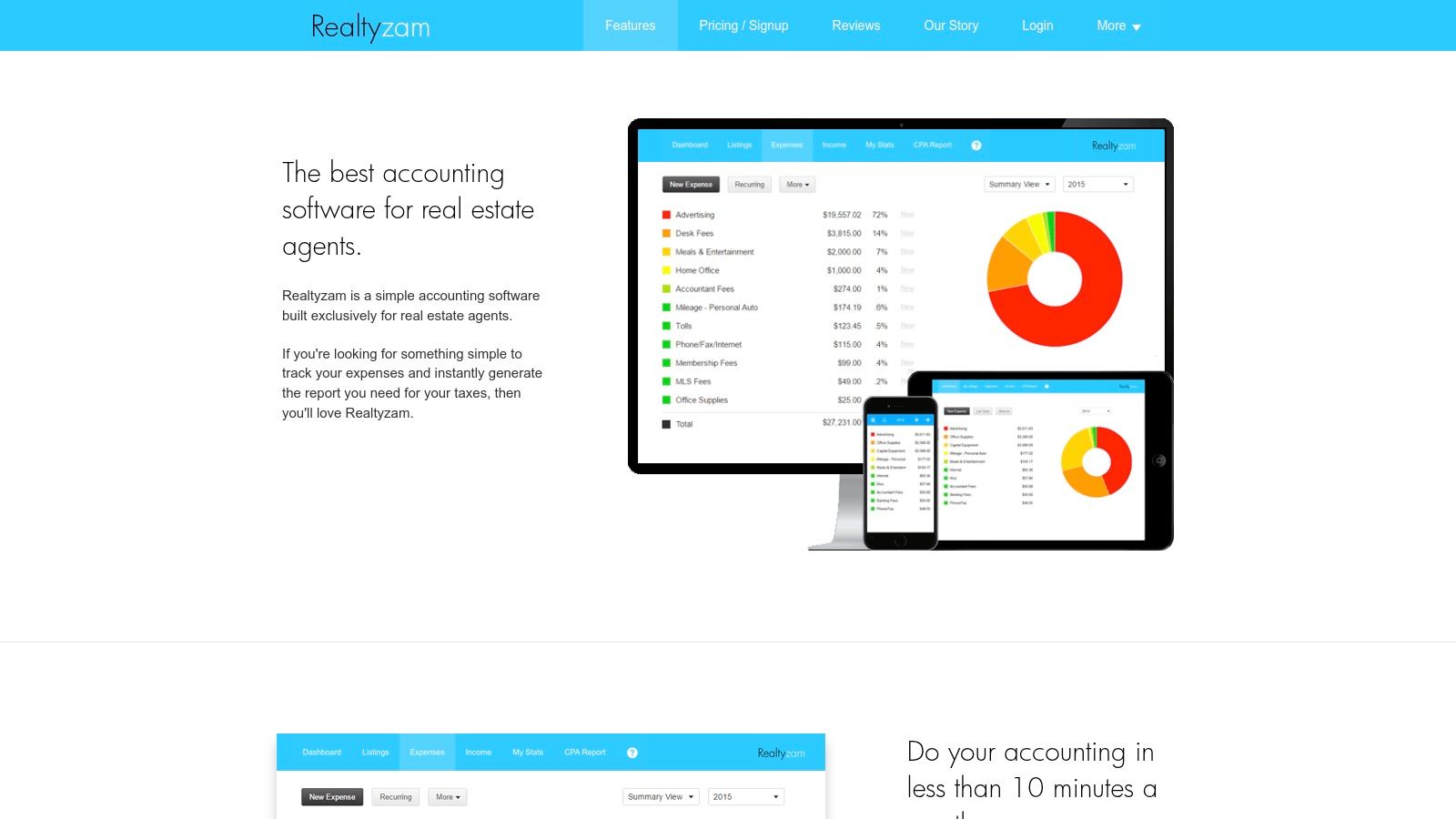
The platform’s key selling point is its glorious simplicity and direct approach to solving agent-specific pain points, especially tax prep. It generates reports that map directly to the IRS Schedule C, saving agents and their accountants a metric ton of time and headaches. Pricing is transparent and affordable, with a generous 30-day free trial that doesn’t even ask for a credit card. While it lacks the advanced features for property management or investment analysis, Realtyzam absolutely crushes its mission: to provide a dead-simple, effective accounting tool for the busy real estate pro who just needs to get their books in order without a massive learning curve.
Website: https://www.realtyzam.com
Best For: Individual real estate agents needing simple, tax-focused bookkeeping.
| Pros | Cons |
|---|---|
| Extremely easy to learn and use | Not suitable for property management |
| Reports align directly with Schedule C for taxes | Mobile app has reported limitations |
| Generous 30-day free trial without a credit card | Lacks deep, advanced accounting features |
11. Loft47
Loft47 is a specialized back-office weapon built to annihilate one of the biggest headaches for brokerages: commission accounting. Forget being a general ledger; it acts as a powerful middleware that automates gnarly commission plans, agent caps, and team splits before syncing flawlessly with QuickBooks Online or Xero. This makes it one of the best real estate accounting software choices for brokerage owners who are sick of manual spreadsheet hell and want an audit-ready system that plugs directly into their existing deal management platforms like dotloop and SkySlope. Its entire reason for being is to eliminate manual data entry and ensure agents get paid accurately and on time, every time.
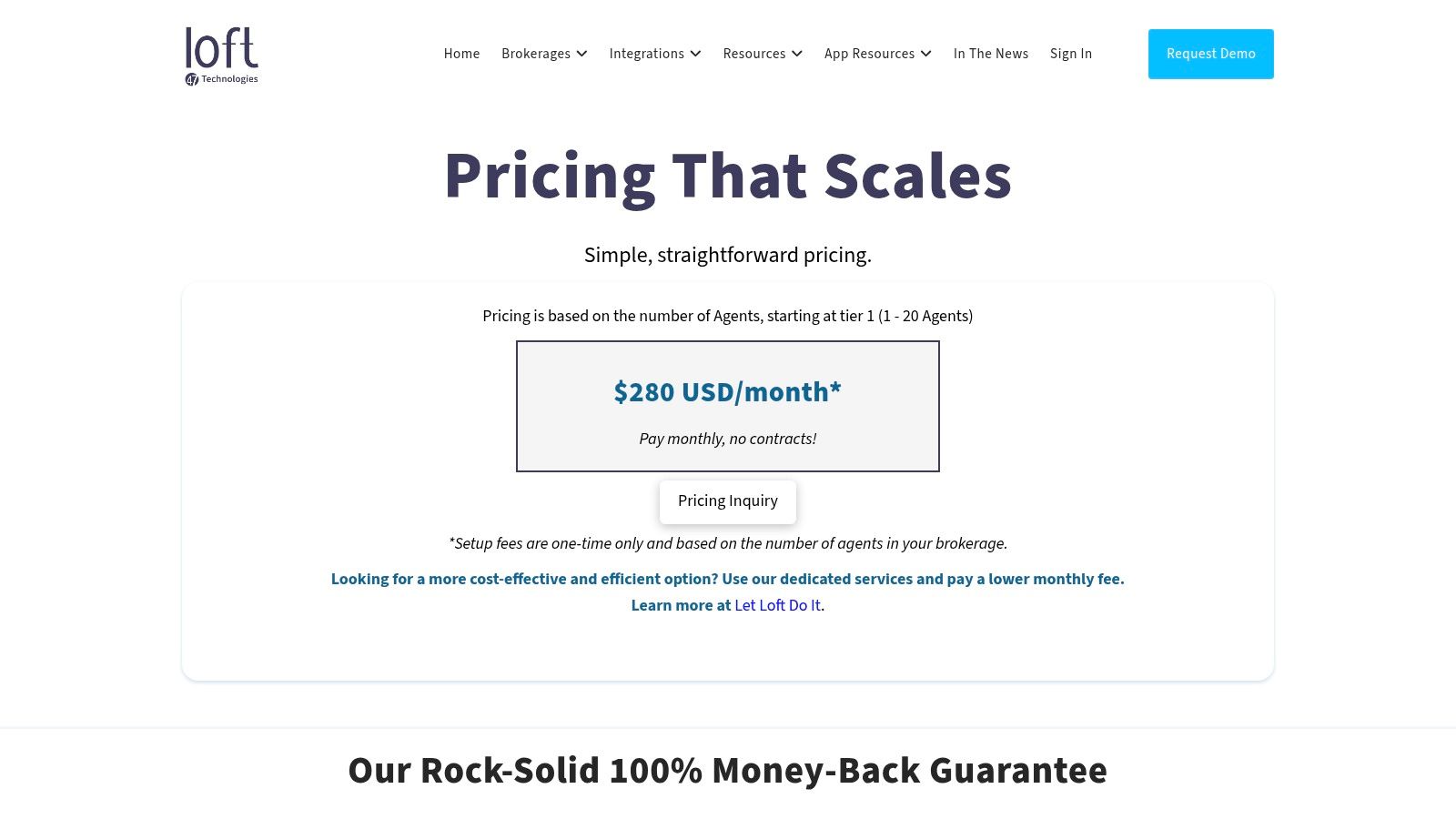
The platform’s laser focus on commissions is its unique superpower. It isn’t trying to be an all-in-one property manager; it does one thing, and it does it exceptionally well. The trade-off is its pricing model, which includes a one-time setup fee and a monthly per-agent cost, making it a serious commitment for the brokerage. While this structure might be pricey for tiny teams just starting out, growing brokerages find the massive efficiency gains and reduction in accounting errors are well worth the investment. Strong onboarding support ensures a smooth transition from messy spreadsheets to a streamlined, automated workflow.
Website: https://loft47.com/pricing/
Best For: Real estate brokerages needing to automate commission tracking and sync with QuickBooks/Xero.
| Pros | Cons |
|---|---|
| Purpose-built for complex brokerage commissions | One-time setup fees apply |
| Reduces manual accounting and potential errors | Per-agent pricing can be costly for very small teams |
| Strong integration with deal management tools | Niche focus means it’s not a full accounting system |
12. Capterra – Property Management Accounting Category
Instead of a single software, Capterra’s Property Management Accounting category is a powerful discovery engine. Think of it as a sprawling digital marketplace where you can compare dozens of tools side-by-side, making it an essential first stop for anyone hunting for the best real estate accounting software for their specific needs. Its real value is the treasure trove of aggregated user reviews, detailed feature filters, and direct comparisons that let you quickly slash through the noise, from big-name enterprise systems to niche solutions you’d otherwise never find. You can filter by portfolio size, specific accounting features like CAM reconciliation or 1099 preparation, and deployment type.
While the platform is an invaluable research tool, you have to use it wisely. Pricing info can sometimes be stale or based on third-party data, so it’s critical to verify costs directly with the vendor. The platform’s business model also means some listings are promoted, so don’t just stare at the top results. Dive deep into the reviews and use the comparison feature to get a true feel for how different platforms stack up. Think of it less as a definitive guide and more as a detailed battle map to help you navigate the software landscape and find your perfect weapon.
Website: https://www.capterra.com/property-management-accounting-software/
Best For: Investors and managers in the initial research phase of selecting software.
| Pros | Cons |
|---|---|
| Broad coverage of the software market | Pricing data can be outdated or inaccurate |
| Verified and up-to-date user reviews | Promoted listings may influence search results |
| Helps discover lesser-known niche solutions | Requires cross-checking information on vendor sites |
Top 12 Real Estate Accounting Software Comparison
| Solution | Core Features & Accounting | User Experience & Quality ★★★★☆ | Value & Pricing 💰 | Target Audience 👥 | Unique Selling Points ✨ |
|---|---|---|---|---|---|
| AppFolio Property Manager | Integrated property mgmt + accounting, portals | Enterprise-grade workflows, mobile apps | Quote-based, best for mid-large portfolios 💰💰💰 | Mid to large portfolios 👥 | Deep accounting + property mgmt, widely adopted 🏆 |
| Buildium | Core accounting, maintenance, portals | Transparent tiers, free trial | Transparent plan tiers, fees add with units 💰💰 | Small to medium managers 👥 | Transparent pricing, strong SMB reputation |
| Yardi Breeze | Payables/receivables, leasing, portals | Low per-unit pricing, backed by Yardi ecosystem | Starter pricing published, monthly minimum fees 💰💰 | Small to mid-size portfolios 👥 | Cloud-based, supports residential & commercial |
| DoorLoop | Accounting, leasing, payment processing | Clear self-serve pricing, robust support | Transparent plans, discounts for annual billing 💰💰 | Landlords & growing firms 👥 | Transparent pricing, great customer support ✨ |
| Rentec Direct | Accounting, ACH rent collection, portals | Low cost, free trial | Affordable per-unit, some add-on fees 💰 | Small landlords, property managers👥 | Unlimited storage & users, free trial available |
| Stessa | Accounting, tax reports, bank feeds | Free Essentials plan | Free tier + low-cost paid plans 💰 | Small portfolios, DIY investors👥 | Free tier, rental-focused tax workflows 🏆 |
| Propertyware (RealPage) | Trust accounting, CAM, inspections, e-signature | Unlimited support, training | Clear per-unit pricing, implementation fee 💰💰 | Single-family rental managers 👥 | Focus on single-family rentals, unlimited support |
| Rent Manager (LCS) | Full accounting, 450+ reports, portals | Highly configurable | Quote-based, implementation fee applies 💰💰 | All portfolio sizes 👥 | Deep customization, broad feature set ✨ |
| QuickBooks Online (Intuit) | General accounting, payroll, integrations | Widely known, frequent promotions | Multiple tiers, subscription price rising 💰 | Real estate businesses & bookkeepers👥 | Extensive integrations, easy add-ons |
| Realtyzam | Bookkeeping, mileage tracking, agent reports | Easy to learn, agent-specific | Generous free trial, starter threshold 💰 | Real estate agents 👥 | Tailored for agents, simple tax-ready accounting |
| Loft47 | Commission automation, audit-ready ledgers | Strong onboarding, support | Setup fees + per-agent pricing 💰💰 | Brokerages & teams 👥 | Brokerage-specific, commission plan automation ✨ |
| Capterra PM Accounting | Software discovery, reviews, price snapshots | Verified user reviews | Free to use, pricing may be outdated 🆓 | Buyers/researchers 👥 | Market overview, side-by-side comparisons |
Making the Final Call: Your Next Move for Financial Clarity
Alright, we’ve blitzed through the digital landscape of real estate accounting, from all-in-one titans like AppFolio and Buildium to sharpshooter tools like Stessa and Loft47. The flood of features, pricing tiers, and interfaces can make your head spin, but the key takeaway is simple: there is no single “best real estate accounting software” for everyone. The best platform is the one that fits your specific needs, scale, and grand vision like a glove.
The ultimate goal isn’t just to ditch a spreadsheet. It’s to reclaim your time, vaporize costly errors, and get the financial clarity you need to make smarter, faster moves in a market as wild as Los Angeles. It’s about turning raw data into a strategic weapon that fuels your growth.
Synthesizing Your Options
Let’s cut to the chase and distill this down to actionable choices based on your role in the real estate game:
- For the DIY Landlord & Flipper: Your priorities are simplicity and cost-effectiveness. Stessa is the undisputed champ here with its powerhouse free tier for tracking rental income and expenses. If you’re flipping properties, a streamlined solution like Realtyzam or a smartly configured QuickBooks Online gives you the project-based accounting you need without the bloat.
- For the Growing Property Management Firm: Scalability is your battle cry. You need a system that can grow with your portfolio. Buildium, DoorLoop, and Rentec Direct strike a killer balance of comprehensive features, user-friendly interfaces, and tiered pricing that won’t bleed you dry as you add more doors to your roster.
- For the Established Brokerage & Enterprise: Your needs are next-level, involving complex agent commissions, trust accounting, and heavy-duty reporting. Loft47 is a beast with its specialized brokerage tools, while enterprise-grade solutions like Yardi Breeze (or its bigger siblings) and Propertyware are built to handle massive portfolios and intricate financial workflows.
Your Action Plan for Implementation
Picking your software is just the first step. The real win is a flawless implementation. Before you sign on the dotted line, map out a clear game plan. To ensure you’re making the best decision for financial clarity, consider utilizing tools like a cash flow calculator to project your returns and understand exactly what financial data you need to track.
Once you have a shortlist, get in the trenches. Sign up for every free trial and book personalized demos. Show up armed with a list of non-negotiable questions tailored to your biggest headaches. Grill them on data migration from your current system, the level of customer support included, and any sneaky implementation fees. A smooth transition is just as crucial as the software’s feature set. This diligence upfront will save you a world of pain and ensure you’ve found a true partner for your financial domination.
Navigating the complexities of real estate finance is our specialty. At ACME Real Estate, we use cutting-edge technology to provide our clients with a seamless and transparent experience, whether you’re buying, selling, or investing in the LA market. Let us put our expertise to work for you; visit us at ACME Real Estate to see how we’re redefining real estate in Los Angeles.
